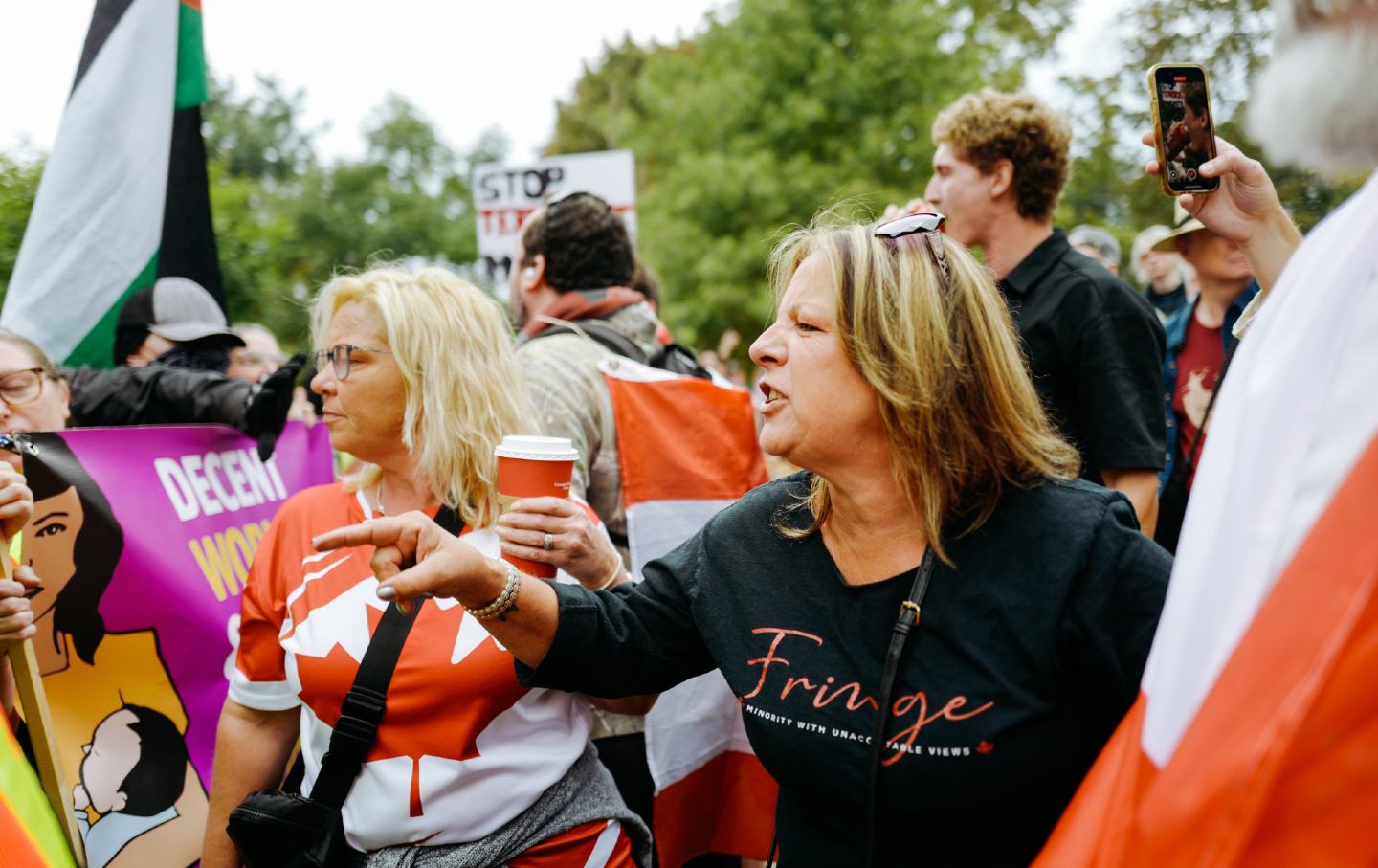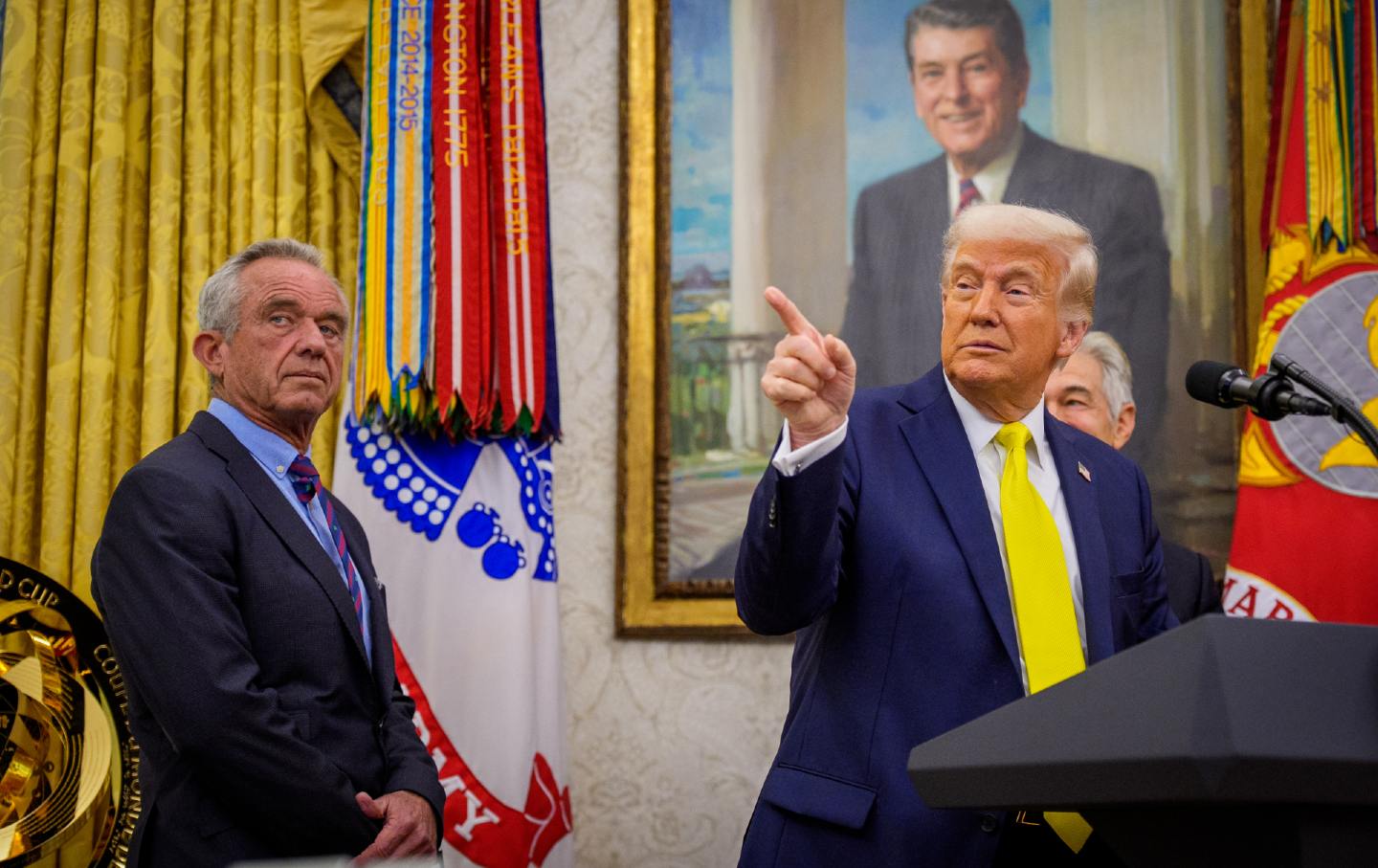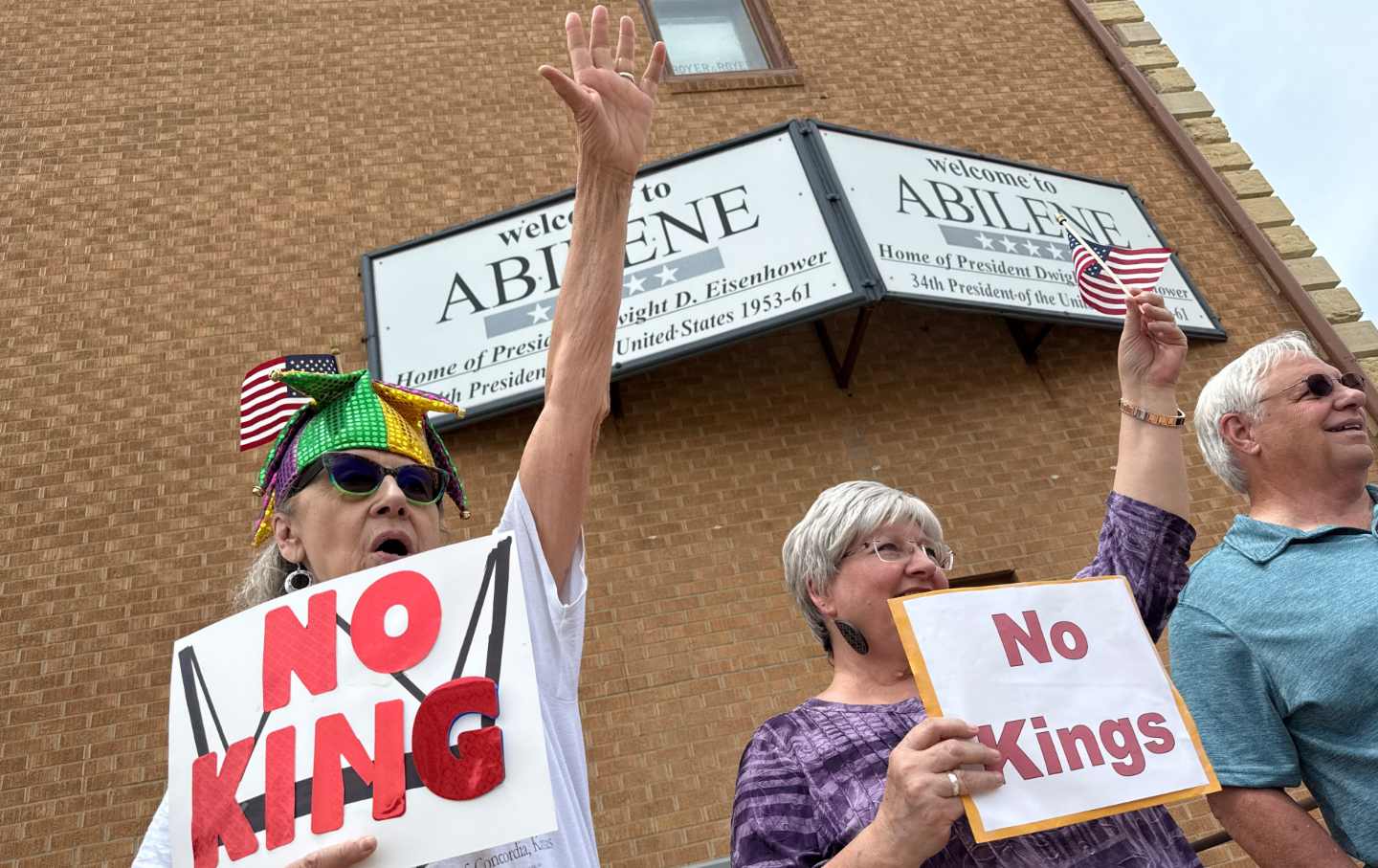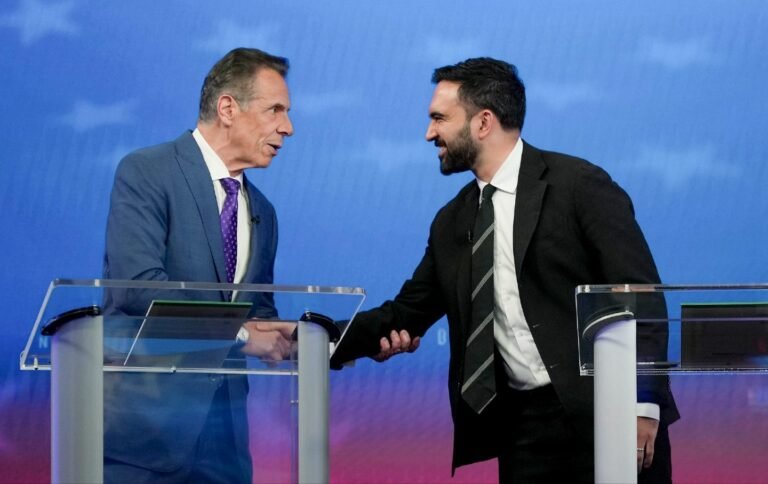Politics
/
October 27, 2025
Vote for Zohran, not the moron.
Andrew Cuomo greets Zohran Mamdani before a mayoral debate at Rockefeller Center, on October 16, 2025 in New York City.
(Angelina Katsanis / Pool/ Getty Images)
Andrew Cuomo started his political life exploiting bigotry. He is now ending it the same sordid way.
In 1977, Cuomo’s father, Mario, was running for mayor of New York against Ed Koch, who was widely and correctly rumored to be a closeted gay man. Andrew Cuomo was reportedly the mastermind behind nasty anonymous posters plastered throughout the city that urged the electorate to “Vote for Cuomo, not the homo.” (Cuomo has always denied responsibility for the poster, a disavowal that very few people, including Koch, took seriously.) This crude appeal to prejudice failed. Koch soundly defeated Mario Cuomo. The story of the posters continues to tarnish the legacy of the Cuomo family.
Now, nearly 50 years later, a Cuomo—this time, Andrew—is once again running for New York City mayor. And, once again, Andrew Cuomo is diving into the gutter.
The same meanness of spirit that embraced naked homophobia in 1977 is now more than willing to stir up racism and Islamophobia in 2025. Cuomo has already lost the New York Democratic mayoral primary and, according to all available polling, is about to be thoroughly trounced by front-runner Zohran Mamdani in next Tuesday’s general election. In his desperation, Cuomo has gone back to his familiar playbook of dirty tricks. Last Thursday, Cuomo appeared on the show of right-wing radio host Sid Rosenberg and said, “God forbid another 9/11. Can you imagine Mamdani in the seat?” Rosenberg, who had previously called Mamdani a “terrorist,” responded by saying, “Yea, I could. He’d be cheering.” Cuomo laughed and said, “That’s another problem.”
These comments weren’t accidental. They’re part of a larger message of bigotry embraced by Cuomo, his campaign, and his most prominent supporters. On the same day as the interview, Cuomo was endorsed by outgoing New York City Mayor Eric Adams—himself so disgraced and discredited that he was driven first from the Democratic primary and then from the race altogether. Adams, with Cuomo by his side, said, “New York can’t be Europe, folks. I don’t know what is wrong with people. You see what’s playing out in other countries because of Islamic extremism.”
Current Issue

The previous night, Cuomo’s campaign had briefly posted a disturbing, ultra-racist AI-generated video that showed, as The New York Times notes, “Mamdani’s supporters as trespassers, domestic abusers, pimps, drug dealers and drunken drivers, and showing a Black shoplifter in a kaffiyeh.” In the video, a seemingly 1970s-era Black pimp shows the back of his van, which is filled with young, white sex workers. The video also shows Mamdani eating rice with his hands—a clear invocation of a far-right anti-Mamdani trope that has surfaced during the election.
The Cuomo campaign disavowed the video, blaming it on a “junior staffer.” But even after this disavowal, billionaire Bill Ackman, one of Cuomo’s most prominent supporters, who has spent $1.25 million on the race, praised the ad as “a bit of humor” that is “worth a watch.”
Ackman is not the only billionaire bigot lining up behind Cuomo. As Forbes reports, 25 billionaires have donated a combined total of at least $22 million to Cuomo’s mayoral bid. Like Ackman, these billionaires seem to be the prime promoters of Cuomo’s racist and Islamophobic strategy. As Mamdani posted on Thursday, “It’s not just what Andrew Cuomo is saying—it’s who’s funding him. The single largest donor to a pro-Cuomo SuperPAC is Airbnb cofounder/board member Joe Gebbia, who promotes vile and racist messages about immigrants.”
Why have Cuomo and his plutocratic supporters decided to double down on racism? The simplest explanation is that they are racists themselves. While that is almost certainly true, the bigotry has a political and strategic dimension that goes beyond personal psychology.
Cuomo’s strategy is a product of a distinct worldview: the multiculturalism of fear. The United States is an extremely pluralist society, which means that one path to power is playing up group divisions in order to divide and conquer. In his classic political study Nixon Agonistes (1970), Garry Wills offered a memorial portrait of one of the smartest practitioners of the multiculturalism of fear, the late political strategist Kevin Phillips who was a key player in locating the resentment of white ethnics to build up the Republican Party. Phillips told Wills that “the whole secret of politics” is “knowing who hates who.” One example, Phillips noted, was New York. “In New York City, for instance, you make plans from certain rules of exclusion,” Phillips argued. “You can’t get the Jews and the Catholics. The Liberal Party was founded here for Jews opposing Catholics, and the Conservative Party for Catholics fighting Jews. The same kind of basic decision has to be made in national politics.”
Just like Phillips, Cuomo is obsessed with “knowing who hates who.” This explains the curious fact that the Cuomo campaign has made the seemingly contrary argument that Mamdani is too Muslim to be trusted by non-Muslims and also not Muslim enough to earn the support of pious Muslims.
Mamdani is a secular Shia Muslim married to a Hindu. Guided by the philosophy of “knowing who hates who” the Cuomo campaign has made the bizarre and repugnant decision to stir up Sunni-Shia animosity.
On Wednesday, Cuomo posted an ad from a group called Muslims Against Mamdani. One of the people in the ad said, falsely, that Mamdani’s “not a Muslim” but a “self-proclaimed Hindu.”
During Wednesday’s mayoral debate, Cuomo explicitly tried to create a wedge between Sunni and Shia Muslims, saying, “To Zohran, I believe you have been a divisive force in New York, and I believe that’s toxic energy for New York. It’s with the Sunni Muslims when you say decriminalize prostitution, which is haram.”
If the Cuomo campaign is based on the multiculturalism of fear, Mamdani himself has taken the exact opposite tack, offering a pluralism of hope. Far from seeing New York’s diversity as an invitation to practice divide-and-conquer politics, Mamdani has brought his message of economic populism to all communities, showing particular adeptness by running ads in numerous languages such as Hindi and Yiddish.
In July, Al Jazeera reported,
The government of New York state estimates that New Yorkers speak more than 800 languages, and as many as 2.5 million struggle with communicating in English. Experts, however, say Mamdani successfully used his skills in multiple languages to appeal to voters who often are not targeted by mainstream election campaigns, highlighting policy proposals targeting voters’ biggest concerns, like affordability….
Among the areas Mamdani won by large margins were South Asian neighbourhoods such as City Line, Ozone Park and Jamaica Hills; Latino neighbourhoods including Corona, Washington Heights, Pelham Bay and Woodhaven; and Chinese communities in Flushing, Chinatown and Bensonhurst.
Cuomo and Mamdani both know that New York is one of the most ethnically and socially diverse cities in the world. Cuomo has used this diversity as the basis of a politics of fear, while Mamdani has offered a politics of hope. Mamdani is a pluralist who speaks to voters in their many languages, but with the same message of economic populism to build a more cohesive society. Cuomo relies on fear because he has no positive message to offer.
Popular
“swipe left below to view more authors”Swipe →
On Wednesday, Mamdani told an interviewer: “This is Andrew Cuomo’s final moments in public life and he’s choosing to spend them making racist attacks.” This is an all too true epitaph. Cuomo had one last chance to make his life amount to something more than a cynical exercise in the exploitation of bigotry. It is sad, but hardly surprising, that he refused the opportunity to redeem his miserable career.
More from The Nation

Canada’s shameful refusal to acknowledge its support of the far right yesterday and today.
Lev Golinkin

Trump’s decimation of public health systems isn’t about efficiency, cost-saving, or even ideology. It’s about building a world without truth or the possibility of accountability.
Eric Reinhart

As an intern for Jon Tester’s campaign, I saw a disconnect between our claim to authentic Montanan populism and the reality on the ground. In 2025, we need something different.
StudentNation
/
Nick Perkins

Rural activists are ready to take their place and play their part in the coalitions that are forming.
Column
/
Anthony Flaccavento

In this week’s Elie v. U.S., The Nation’s justice correspondent warns of an upcoming SCOTUS case—and hails the wisdom of Uncle Iroh.
Elie Mystal




